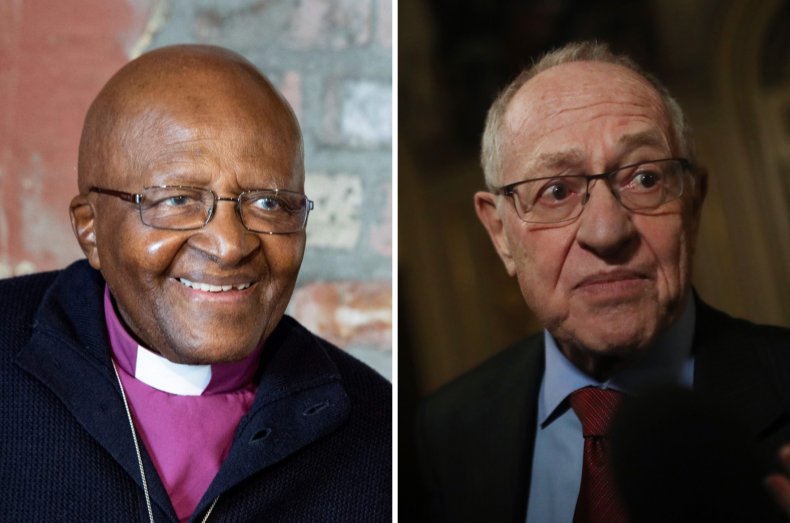As the world mourns the loss of Desmond Tutu, Alan Dershowitz during a recent television interview branded him an "anti-Semite" and "bigot."
Tutu, famed for his tireless efforts that helped tear down South Africa's brutal apartheid regime, died on Sunday aged 90.
Tributes have poured in from all over the world, with former President Barack Obama hailing the Nobel Peace Prize-winning archbishop as "a moral compass for me and so many others." He was "grounded in the struggle for liberation and justice in his own country, but also concerned with injustice everywhere," Obama added.
But Dershowitz, an attorney and Harvard law professor, took a moment during an interview on Fox News to decry such tributes.
Dershowitz uses his appearance on Fox to call Tutu a bigot pic.twitter.com/wQbUnmHggX
— Acyn (@Acyn) December 28, 2021
"I hope you don't mind if I do this," he began. "The world is mourning Bishop Tutu, who just died the other day. Can I remind the world that although he did some good things, a lot of good things on apartheid, the man was a rampant anti-Semite and bigot?"
Dershowitz went on to claim that Tutu had minimized the Holocaust and "compared Israel to Nazi Germany."
He added: "When we're tearing down statues of Jefferson and Lincoln and Washington, let's not build statues to a deeply, deeply flawed man like Bishop Tutu. Let's make sure that history remembers both the goods he did and the awful, awful bads that he did as well."

Tutu was an outspoken critic of Israel over its treatment of Palestinians and endorsed the Palestinian-led boycott movement against Israel, but Dershowitz told Newsweek his remarks stemmed from Tutu's "criticism of Jews."
"He didn't talk about the Israel lobby, he talked about the Jewish lobby," Dershowitz said. "He minimized the suffering of Jews during the Holocaust. He said that getting killed in gas chambers was an easy death compared to apartheid. He said that Jews claimed a monopoly on the Holocaust. He demanded that Jews forgive the Nazis for killing them."
Tutu prompted an outcry after urging to pray for and forgive those responsible for Nazi atrocities after a visit to Jerusalem's Yad Vashem Holocaust memorial in 1989.
Tutu "encouraged others to have similar views and because he was so influential, he became the most influential anti-Semite of our time," Dershowitz went on.
"People say you shouldn't speak ill of the dead. Well, that's wrong… The bottom line is that at a time when people are reckoning with the careers, of people with mixed legacies, whether it be Thomas Jefferson, Abraham Lincoln, George Washington, and others, we have to include in a reckoning of Tutu his evil, bigotry against Jews, which has existed for many, many, many years."
Tutu addressed accusations of anti-Semitism several times, including in a 2002 address given in Boston that was published in The Guardian newspaper.
In the speech, he said criticism of the Israeli government is often decried as anti-Semitism in the U.S. "People are scared in this country, to say wrong is wrong because the Jewish lobby is powerful–very powerful. Well, so what?" he said. "We live in a moral universe. The apartheid government was very powerful, but today it no longer exists. Hitler, Mussolini, Stalin, Pinochet, Milosevic, and Idi Amin were all powerful, but in the end they bit the dust."
"Israel has a right to secure borders," Tutu said in the same speech, but added: "What is not so understandable, not justified, is what it did to another people to guarantee its existence. I've been very deeply distressed in my visit to the Holy Land; it reminded me so much of what happened to us Black people in South Africa."
Tutu said he said seen "the humiliation of the Palestinians at checkpoints," adding he had "experienced Palestinians pointing to what were their homes, now occupied by Jewish Israelis."
"Have our Jewish sisters and brothers forgotten their humiliation?" Tutu added. "Have they forgotten the collective punishment, the home demolitions, in their own history so soon?"
UPDATE 12/28/21 8:15 a.m. ET: This article has been updated with additional comments from Alan Dershowitz.

Post a Comment